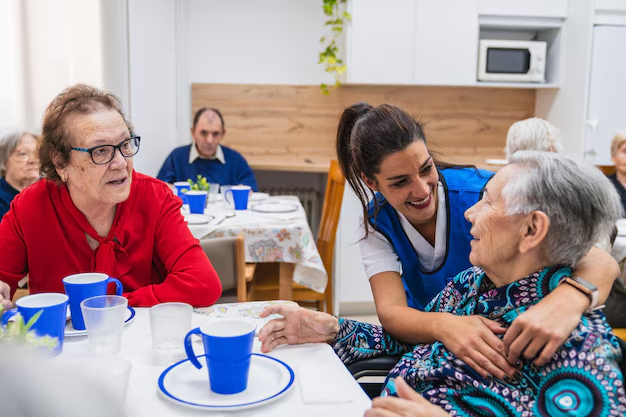Your Guide to Do Assisted Living Facilities Accept Medicare
What You Get:
Free Guide
Free, helpful information about Medicare Insurance and related Do Assisted Living Facilities Accept Medicare topics.
Helpful Information
Get clear and easy-to-understand details about Do Assisted Living Facilities Accept Medicare topics and resources.
Personalized Offers
Answer a few optional questions to receive offers or information related to Medicare Insurance. The survey is optional and not required to access your free guide.
Do Assisted Living Facilities Take Medicare? Here's What You Need to Know
Navigating the complexities of senior care can be daunting, especially when faced with the financial implications. A common question many families ask is: Does Medicare cover the costs of assisted living facilities? The answer is, unfortunately, No, Medicare does not cover the costs associated with residing in an assisted living facility. However, understanding why and exploring alternative solutions can be the key to effectively managing these expenses.
Understanding Medicare's Limitations
Medicare is primarily designed to cover acute healthcare services rather than custodial care, which is the primary service provided by assisted living facilities. This includes assistance with daily living activities such as bathing, dressing, and eating. Medicare generally covers short-term healthcare needs such as hospital stays, limited home health services, and skilled nursing care under certain conditions, but not long-term residential care.
Alternatives to Cover Assisted Living Costs
While Medicare may not cover assisted living expenses, you’re not without options. Many programs and initiatives can help ease the financial burden:
Medicaid: Unlike Medicare, Medicaid may offer some coverage for long-term care depending on your state's specific rules and individual qualifications. This can include assistance with the costs of assisted living for eligible low-income seniors.
Veteran Benefits: If the person in need of care is a veteran, or a surviving spouse of a veteran, they might qualify for the Veterans Aid & Attendance Pension, which provides additional monthly benefits to cover senior living costs.
Long-Term Care Insurance: This type of policy, if purchased before the need arises, can help cover assisted living expenses. It's crucial to review specific policy details as coverage varies widely.
State Assistance Programs: Many states have specific programs that aim to help seniors with their housing and healthcare needs. These may include subsidies for assisted living or community-based services.
Reverse Mortgages: For seniors who own their home, a reverse mortgage allows them to use the equity built up in their property. Proceeds from a reverse mortgage can be used to pay for assisted living, although this option requires careful financial planning.
Financial Assistance Options
When planning for assisted living costs, consider these additional financial assistance methods to alleviate the burden:
Social Security Benefits: Regular social security income can subsidize the cost of assisted living.
Private Savings & Retirement Accounts: Using personal savings or drawing from retirement funds such as 401(k) or IRAs may be necessary, though it’s important to understand any tax implications.
Family Contributions: Sometimes family members come together to share the costs, making it more manageable collectively.
Though Medicare doesn’t fund assisted living facilities, understanding and combining these resources can provide substantial relief, ensuring your loved ones receive the care they deserve.
Quick Resource Guide for Financial and Educational Support 🎯
- 🩺 Medicaid Programs: Check eligibility for state-sponsored Medicaid programs.
- 🎖️ Veterans Administration Benefits: Explore Aid & Attendance Pension for veterans and their spouses.
- 🏠 Long-Term Care Insurance: Review current policies or consider future purchases.
- 📊 State Assistance Programs: Research local state-funded support initiatives.
- 🏡 Reverse Mortgages: Consult with financial advisors about home equity options.
- 💵 Social Security: Use benefits in budget planning.
- 💰 Family Support: Discuss contributions with relatives.
- 📚 Educational Grants: Some educational programs provide financial literacy resources to better navigate elder care expenses.
Preparing financially for assisted living care may require piecing together multiple programs and savings options. By being informed and proactive, you can find a path that ensures the well-being of your loved ones.
What You Get:
Free Medicare Insurance Guide
Free, helpful information about Do Assisted Living Facilities Accept Medicare and related resources.

Helpful Information
Get clear, easy-to-understand details about Do Assisted Living Facilities Accept Medicare topics.

Optional Personalized Offers
Answer a few optional questions to see offers or information related to Medicare Insurance. Participation is not required to get your free guide.


Discover More
- Am I Elgible For Medicare
- Am I Enrolled In Medicare
- Am I Qualified For Medicare
- Are Adult Diapers Covered By Medicare
- Are Chemotherapy Drugs Covered By Medicare Part d
- Are Colonoscopies Covered By Medicare
- Are Covid Tests Covered By Medicare
- Are Cpap Machines Covered By Medicare
- Are Cpap Supplies Covered By Medicare
- Are Dental Implants Covered By Medicare
